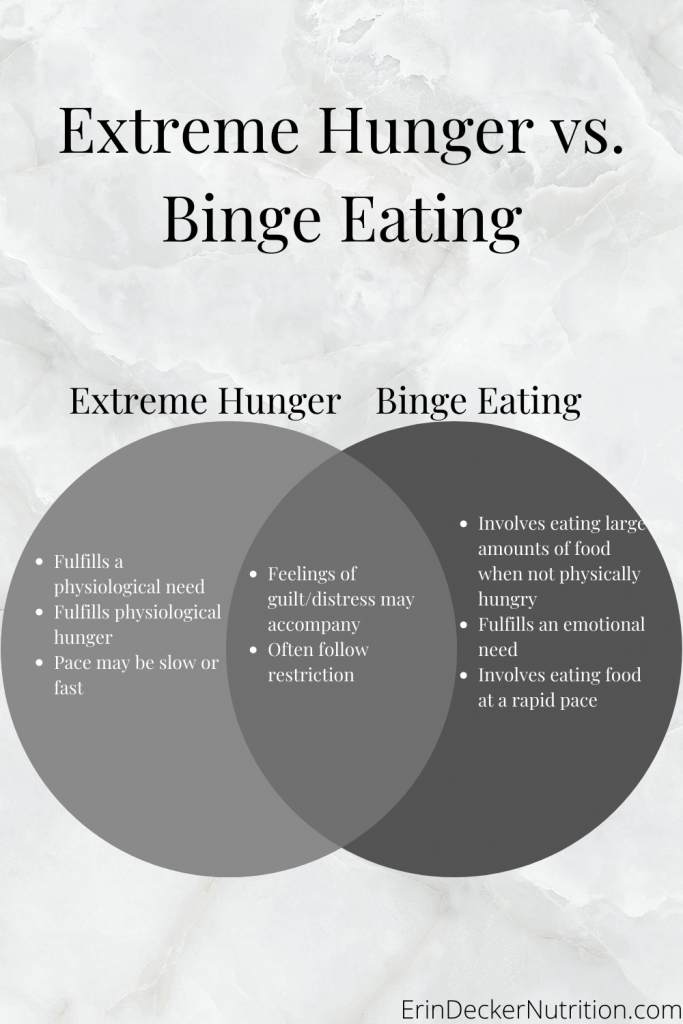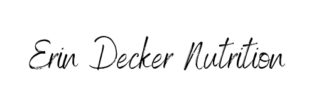Have you found yourself obsessing over food, quickly hungry again after eating, and then guilt ridden by this all-consuming thought?
If you have a history of dieting or restriction, you could be experiencing extreme hunger.
What is extreme hunger?
Extreme hunger, known as hyperphagia or polyphagia, is the feeling of having an unexplained, larger than normal appetite.
It is a NORMAL biological response to food restriction. It often shows up for those who have been dieting, restricting their food, and particularly individuals recovering from eating disorders.
What causes extreme hunger?
First, let me describe what happens before extreme hunger shows up.
During periods of restriction, the body actually shuts down your ability to tune in to hunger and fullness cues. So you may not feel hungry, despite your body needing energy. This happens for a number of reasons.
For one, your digestive system slows down. This happens to conserve energy and allow more time for nutrients to be absorbed. As a result, you feel full sooner and for longer.
In addition, after extended periods of time without access to food, the body switches its energy source from glucose (which comes from carbohydrates) to ketones (which comes from fat). Ketones seem to have an appetite-suppressing effect.
I once heard this described as a pretty amazing and compassionate thing our body does for us: if we are ever in a situation where we are starving and don’t have access to food, our body will turn off hunger cues to make us more comfortable.
Once consistent access to food has returned (a GOOD thing!) hunger cues begin their recovery and extreme hunger may present itself.
Sometimes this return is subtle, and other times hunger returns with a vengeance. This is because your body is working hard to play catch up and simultaneously resume daily functions. For children and adolescents, the body is also trying to catch back up with normal growth and development.
While the duration and severity may vary, extreme hunger doesn’t JUST show up in those with eating disorders. It also can show up following any period of calorie restriction. It adds to the intensity of the dieting cycle.
Extreme hunger may also show up in other medical conditions unassociated with dieting and eating disorders, including hyperthyroidism, which increases metabolism, and untreated diabetes, in which a lack of insulin induces a starvation-like state.
Symptoms of extreme hunger
For some, the symptoms of extreme hunger feel pretty self-explanatory. It is a hungry feeling that doesn’t seem to go away, no matter how much you eat. Some common symptoms may be:
- Hunger despite eating 3 meals and 3 snacks (or more!)
- Constantly thinking about food or obsessing
- Anxiety
- Depression
- Irritability
- Low energy
Extreme hunger versus binge eating
Extreme hunger and binge eating have similar characteristics. However, the biological drive for each is very different.
| Extreme Hunger | Binge Eating |
| Follows restriction Fulfills a physiological need Feelings of distress and guilt may accompany (but not always) | May follow restriction (but not always) Involves eating large amounts of food when not physically hungry Fulfills an emotional need Involves eating food at a rapid pace Accompanied by feelings of distress, guilt, embarrassment, shame, and/or depression Involves eating until uncomfortably full |

How long does extreme hunger last?
Frankly, extreme hunger lasts as long as it needs to. Remember, the goal is to play “catch-up” and replenish nutrient stores while simultaneously supporting day-to-day body functions. Once this goal is achieved, extreme hunger may subside. This will vary person to person.
How to Cope with Extreme Hunger
If you are recovering from an eating disorder, disordered eating, or restrictive dieting, extreme hunger can be scary! In many cases, you might need to eat two-to-three times what others around you are eating. It is confusing, triggering, and can lead to feeling out of control.
See below for tips on how to cope with thoughts and feelings that may come up.
I Feel Guilty After Eating
This is understandable in our culture, and may be a part of what drove the restriction in the first place.
From a nonjudgmental place, ask yourself:
- Where is this guilt coming from?
- What “rules” am I breaking?
- Who came up with these rules?
Find affirmations to repeat to yourself when these thoughts come up, such as:
- My body is doing what it needs to do to keep me alive and healthy
- Rebuilding my body takes a lot of time and energy
- Feeding my body is nothing to be ashamed of
- I deserve to eat
If you are struggling with guilt and shame around eating, please speak with a mental health professional and/or a registered dietitian.
I’m still hungry after eating
This is common. Keep in mind you may need to eat AT LEAST 3 meals and 3 snacks per day.
If you find you are still hungry after implementing this, take a look at your meals and snacks. Are you eating until you are satisfied at meal times? Is there room to eat more?
For some, extreme hunger may correspond with early satiety, or feeling full really quickly. Remember: a side effect of restriction is your digestive system slowing down. This does not mean your body does not need food.
If this is the case for you, you may need to eat even more frequently. Keep in mind that this early satiety is TEMPORARY and, as the saying goes, “the only way out is through!”
I can’t stop thinking about food
Did you know that “thinking about food” is one of the main signs of hunger? So this makes sense! The only way to cope with this is to eat. Honor the hunger, feed your body, repeat.
In order to become an intuitive eater, you must allow yourself unconditional permission to eat (Tribole and Resch, 2020).
Over time, this obsession will get better and you will have more space for the things that are important to you.
How to Overcome Extreme Hunger
By now, you know that extreme hunger won’t just “go away” on its own. We can’t delay, distract, or will it away. It needs to be fed.
If you are suffering from an eating disorder or just really struggling with your relationship to food, please seek help! This can be tricky to navigate on your own. Erin is a HAES-aligned registered dietitian serving the Raleigh, NC area (and the rest of NC via telehealth). If you are not local, she can help point you in the direction of practitioners in your area. Book and appointment today!
Disclaimer:
This blog post is NOT medical advice and is meant for educational and informational purposes only. Always consult with your doctor, therapist, dietitian, or qualified health professional if you have concerns about your eating behaviors.

Extreme hunger is a serious problem and it’s one that many people don’t know the proper solution for. This is a good resource for those that are experiencing the problem at hand.
XVII century was Nicholas Jarry [fr].